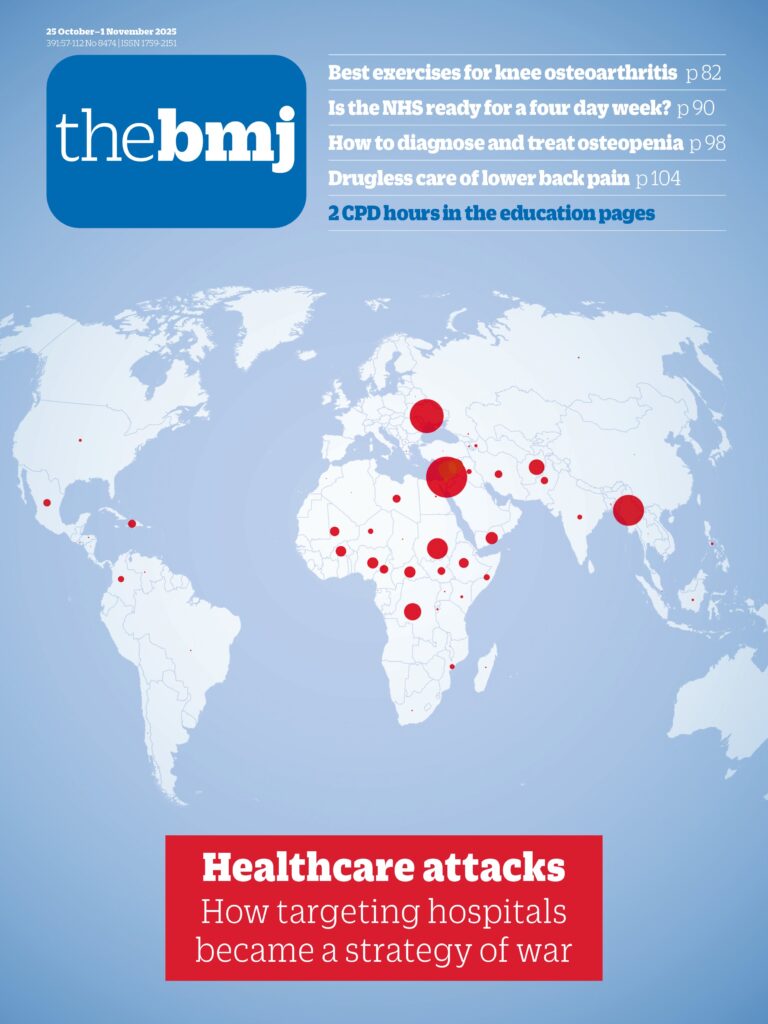Pandemic preparedness and response must be rooted in trust, cooperation, and commitment to greater health equity, says Michael Marmot
The covid-19 pandemic brought to mind Albert Camus’s The Plague. In 2020, a colleague and I quoted a reading of Camus that “the pestilence is at once blight and revelation. It brings the hidden truth of a corrupt world to the surface.” Less poetically, but more dramatically, the evidence is clear: pandemics reveal and amplify inequalities in society.1
To examine the evidence of this inequality-pandemic cycle and to recommend how to build health security in a global age the Joint United Nations Programme on HIV/AIDS executive director Winnie Byanyima set up the Global Council on Inequality, AIDS, and Pandemics.2 Its co-chairs, Joseph Stiglitz, a Nobel prize winning economist; Monica Geingoss, former first lady of Namibia; and I, are committed to action on social determinants of health and health equity. Our report is published on 3 November 2025.3
Our first major finding is that high levels of inequality, within and between countries, is making the world more vulnerable to pandemics, making pandemics more economically disruptive and deadly, and making pandemics last longer. Pandemics in turn increase inequality, driving the cyclical, self-reinforcing relationship. Within countries, inequalities of income and other social conditions are related to HIV incidence and AIDS and covid-19 mortality.4
Inequality between countries is made worse by the global financial architecture. There have been cuts to overseas development assistance from high income countries, high debt burdens for low and middle income countries, and austerity imposed by international financial institutions. All of these have limited the fiscal space for countries to develop the social programmes that would protect against pandemics and respond to them when they occur.
Today, 3.3 billion people live in countries that spend more on debt repayment than on healthcare. The UK is among the countries that have cut their development assistance. The recent closure of the US Agency for International Development and the cuts to the President’s Emergency Plan for AIDS Relief pose great challenges to healthcare and public health funding for many countries. When pandemics arrive, low income countries will have less money for vaccines and healthcare and to support families. During covid-19 low income countries spent about 2% of gross domestic product on non-health pandemic measures, compared with 8% in high income countries.
A second key finding relates to these figures. A research review showed that actions on social determinants of health were vital in preparing for pandemics and responding to them when they occur.5 We should consider these the social determinants of pandemics. Inequalities in the conditions in which people are born, grow, live, work, and age and inequalities in power, money, and resources create health inequalities in non-pandemic times and during pandemics.5 In turn, pandemics negatively impact these social determinants. Heightened vulnerability arises from socioeconomic inequalities in income, education, race or ethnicity, gender, sexuality, and other markers of social stratification. Such vulnerability exists before health systems come into play and cannot be entirely mitigated by healthcare or access to medical technologies.
Failure to respond equitably to today’s pandemics, such as AIDS and tuberculosis, perpetuates the inequality-pandemic cycle. Our evidence based recommendations to break the cycle come in four areas.
Firstly, financial barriers in the global architecture must be removed to allow all countries the fiscal space to respond to pandemics. Progress can be made by debt relief during a pandemic and by moving away from damaging austerity that has been imposed by international financial institutions.
Secondly, we need to recognise the importance of investing in tackling the social determinants of pandemics, including enhancing social protection policies and programmes. Such investment will be important to mitigate and respond to the next pandemic. A crucial lesson from covid-19 is that pandemic preparedness that neglects social determinants of health will not be adequate.
Thirdly, local and regional production of health technology must be built alongside a new governance system of research and development capable of ensuring technology and information sharing as public goods necessary to stop pandemics. Inequalities in vaccine availability between high income countries and lower and middle income countries must be consigned to the past.
Finally, greater trust, equality, and efficiency must be built into pandemic response by investing in multisectoral response and community led pandemic infrastructure in partnership with the government.
Our response to Camus is that preparing for and responding to the next pandemic should reveal the hidden strengths of a world based on trust, cooperation, and a commitment to greater health equity.
Footnotes
-
Not commissioned, not externally peer reviewed.
-
The Council on Inequality, AIDS, and Pandemics was funded by UNAIDS, with support from the Swiss Agency for Development and Cooperation. MM has no interests to declare.

